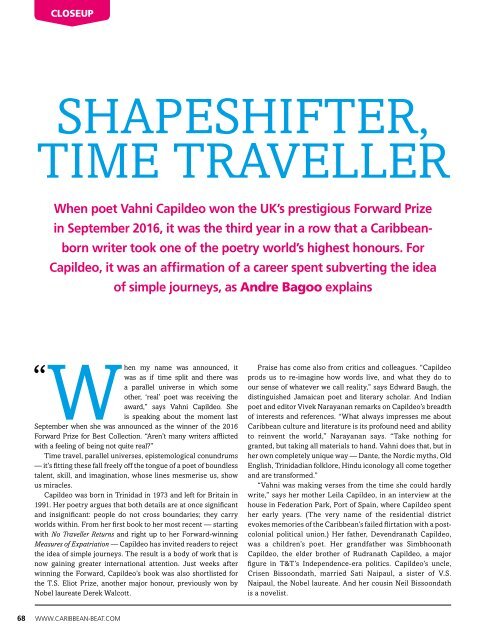Caribbean Beat — January/February 2017 (#143)
A calendar of events; music, film, and book reviews; travel features; people profiles, and much more.
A calendar of events; music, film, and book reviews; travel features; people profiles, and much more.
Create successful ePaper yourself
Turn your PDF publications into a flip-book with our unique Google optimized e-Paper software.
closeup<br />
Shapeshifter,<br />
time traveller<br />
When poet Vahni Capildeo won the UK’s prestigious Forward Prize<br />
in September 2016, it was the third year in a row that a <strong>Caribbean</strong>born<br />
writer took one of the poetry world’s highest honours. For<br />
Capildeo, it was an affirmation of a career spent subverting the idea<br />
of simple journeys, as Andre Bagoo explains<br />
“<br />
When my name was announced, it<br />
was as if time split and there was<br />
a parallel universe in which some<br />
other, ‘real’ poet was receiving the<br />
award,” says Vahni Capildeo. She<br />
is speaking about the moment last<br />
September when she was announced as the winner of the 2016<br />
Forward Prize for Best Collection. “Aren’t many writers afflicted<br />
with a feeling of being not quite real?”<br />
Time travel, parallel universes, epistemological conundrums<br />
<strong>—</strong> it’s fitting these fall freely off the tongue of a poet of boundless<br />
talent, skill, and imagination, whose lines mesmerise us, show<br />
us miracles.<br />
Capildeo was born in Trinidad in 1973 and left for Britain in<br />
1991. Her poetry argues that both details are at once significant<br />
and insignificant: people do not cross boundaries; they carry<br />
worlds within. From her first book to her most recent <strong>—</strong> starting<br />
with No Traveller Returns and right up to her Forward-winning<br />
Measures of Expatriation <strong>—</strong> Capildeo has invited readers to reject<br />
the idea of simple journeys. The result is a body of work that is<br />
now gaining greater international attention. Just weeks after<br />
winning the Forward, Capildeo’s book was also shortlisted for<br />
the T.S. Eliot Prize, another major honour, previously won by<br />
Nobel laureate Derek Walcott.<br />
Praise has come also from critics and colleagues. “Capildeo<br />
prods us to re-imagine how words live, and what they do to<br />
our sense of whatever we call reality,” says Edward Baugh, the<br />
distinguished Jamaican poet and literary scholar. And Indian<br />
poet and editor Vivek Narayanan remarks on Capildeo’s breadth<br />
of interests and references. “What always impresses me about<br />
<strong>Caribbean</strong> culture and literature is its profound need and ability<br />
to reinvent the world,” Narayanan says. “Take nothing for<br />
granted, but taking all materials to hand. Vahni does that, but in<br />
her own completely unique way <strong>—</strong> Dante, the Nordic myths, Old<br />
English, Trinidadian folklore, Hindu iconology all come together<br />
and are transformed.”<br />
“Vahni was making verses from the time she could hardly<br />
write,” says her mother Leila Capildeo, in an interview at the<br />
house in Federation Park, Port of Spain, where Capildeo spent<br />
her early years. (The very name of the residential district<br />
evokes memories of the <strong>Caribbean</strong>’s failed flirtation with a postcolonial<br />
political union.) Her father, Devendranath Capildeo,<br />
was a children’s poet. Her grandfather was Simbhoonath<br />
Capildeo, the elder brother of Rudranath Capildeo, a major<br />
figure in T&T’s Independence-era politics. Capildeo’s uncle,<br />
Crisen Bissoondath, married Sati Naipaul, a sister of V.S.<br />
Naipaul, the Nobel laureate. And her cousin Neil Bissoondath<br />
is a novelist.<br />
68 WWW.CARIBBEAN-BEAT.COM


















